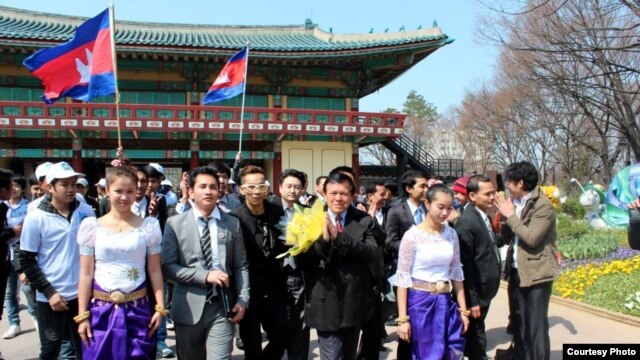30 March 2013
WASHINGTON — Cambodian workers in South Korea say high wages there have helped their families back in Cambodia,
but many here say they would rather work back home, under the rights
circumstances.
An estimated 30,000 Cambodians work throughout South Korean farms, factories and homes, earning far more than they could back in Cambodia. Workers in South Korea earn up to $2,800 per month here.
But in interviews with VOA Khmer, workers say they were pushed to move thousands of miles away from family because there are not enough opportunities in Cambodia.
Sithith Sovann, 34, who now works in Seoul, said he left Kampong Cham province to find work here. He appealed to the government to raise wages in Cambodia so that others won’t have to make such a move. “We have to have enough to spend on the family,” he said in an interview with VOA Khmer.
“My migration was to improve myself, because we can’t be our parents’ successors, farming or doing traditional work,” he said. “If I hadn’t migrated, I may not have been able to change my family’s economics.”
Sok Vantha, 28, from Kampot province, has worked in South Korea for two years. At his home, there was not enough work, he said in Skype interview. “I finished university and my first salary was only $70 per month,” he said. “It did not match the price of goods in the market. I could not survive, so I decided to migrate.”
His salary was similar to that of many Cambodians in the workforce. The garment industry, which employs up to 350,000 people, has a wage of about $60 per month, though that is slated to increase to $80 per month. Workers often protest these wages, saying they have not kept up with the price of consumer goods.
In a recent speech, Prime Minister Hun Sen said the wages are improving. At $80 per month, he said, some workers will be able to send money home. He called promises of greater wages by his political opponents “empty.” But opposition lawmakers say Cambodian wages are not advancing enough to keep up with the cost of living in the country.
In South Korea, Sok Vantha said he has been able to work as a laborer and earn good money, but he encouraged Cambodians back home to study hard and be engaged in the Cambodian political process.
“When one understands politics and votes for the right representatives, they can lead the country properly,” he said. “Then there will be higher salaries and plenty of jobs.”
An estimated 30,000 Cambodians work throughout South Korean farms, factories and homes, earning far more than they could back in Cambodia. Workers in South Korea earn up to $2,800 per month here.
But in interviews with VOA Khmer, workers say they were pushed to move thousands of miles away from family because there are not enough opportunities in Cambodia.
Sithith Sovann, 34, who now works in Seoul, said he left Kampong Cham province to find work here. He appealed to the government to raise wages in Cambodia so that others won’t have to make such a move. “We have to have enough to spend on the family,” he said in an interview with VOA Khmer.
“My migration was to improve myself, because we can’t be our parents’ successors, farming or doing traditional work,” he said. “If I hadn’t migrated, I may not have been able to change my family’s economics.”
Sok Vantha, 28, from Kampot province, has worked in South Korea for two years. At his home, there was not enough work, he said in Skype interview. “I finished university and my first salary was only $70 per month,” he said. “It did not match the price of goods in the market. I could not survive, so I decided to migrate.”
His salary was similar to that of many Cambodians in the workforce. The garment industry, which employs up to 350,000 people, has a wage of about $60 per month, though that is slated to increase to $80 per month. Workers often protest these wages, saying they have not kept up with the price of consumer goods.
In a recent speech, Prime Minister Hun Sen said the wages are improving. At $80 per month, he said, some workers will be able to send money home. He called promises of greater wages by his political opponents “empty.” But opposition lawmakers say Cambodian wages are not advancing enough to keep up with the cost of living in the country.
In South Korea, Sok Vantha said he has been able to work as a laborer and earn good money, but he encouraged Cambodians back home to study hard and be engaged in the Cambodian political process.
“When one understands politics and votes for the right representatives, they can lead the country properly,” he said. “Then there will be higher salaries and plenty of jobs.”



3 comments:
Will these people go to vote for the next election or just for another TV-Schow ?
Better for the opposition to see the reality and find more vote inside the country.
We can't always close our eyes and not accept the situation in our country. Therefore the opposition should conentrate with our people in the country include the legal or illegal immigrant from Vietnam or the second generation Vietnamese live in our country.
We can't change the whole world, but we can change our behavior and do our best for our country and for the next generation of Khmer citizen.
What, 1 thousands traitors working in Korea? Come home if you dare. Papa will whip your a***
These workers have families back home who can vote. They supported their families financially so they will tell them to vote for a change for sure. It's very inspiring to see these youths and workers in Korea are so passionate about issues in our country. Hun Sen must worry a bit.
Post a Comment